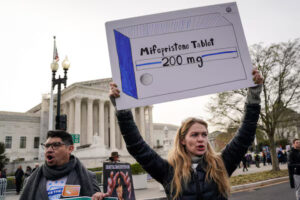For the past six years, the gay advocacy group Out Leadership has produced an index evaluating the business climate for LGBTQ+ individuals across all 50 states, identifying where they can live and work with minimal discrimination. Last year, amidst a surge of anti-LGBTQ+ legislation, the average score for all states dropped for the first time. In 2024, as Republican attacks on gay and transgender rights intensified ahead of the presidential election, the average score declined further, according to Todd Sears, Out Leadership’s founder and CEO.
“It was just confirmation of what we have already seen unfortunately,” Sears told USA TODAY.
New York, Connecticut, and Massachusetts topped the Out Leadership index in 2024, while Arkansas received the lowest score since the index’s inception. The average score across all 50 states was 62.77 out of 100, down from 63.48 in 2023 and 64.61 in 2022.
State rankings declined mainly due to rising anti-LGBTQ+ sentiment and restrictive state legislation, including “Don’t Say Gay” bills in Florida, Indiana, Kansas, and North Carolina, Sears explained. North Carolina saw the sharpest decline, driven by numerous anti-LGBTQ+ bills targeting the health and safety of trans youth.
Sears expressed concern over the growing polarization as GOP strategists and lawmakers push conservative social policies in state legislatures.
“This is not the America where we have fought for and bragged about equality,” he said. “This is a very right-wing approach to telling a significant portion of our country that they don’t have rights.”
He highlighted the dire consequences for LGBTQ+ individuals living in hostile states, including increased harassment, violence, and high suicide rates.
“This massive, massive spike in anti-LGBTQ+ legislation,” Sears said, “makes me fearful for our community.”
Sears called on the business community to support the LGBTQ+ community, noting that corporations have become more hesitant to use their economic influence due to recent right-wing attacks on diversity.
“Because of the fear that has been created in the last two years by the right wing and the vilification of diversity and the vilification of LGBTQ+ people, corporations have been more reticent to use their economic power,” he said. “I try to remind them that they are economic engines in these states in which they operate. Their power hasn’t changed. It’s just the noise that’s been created by these right-wing, anti-inclusive politicians.”
New York maintained the highest rank for LGBTQ+ equality for the fourth consecutive year, scoring 93.67 out of 100 points. Arkansas remained the lowest-ranking state for the second year in a row, with a record low score of 27 points.
Released during Pride Month, Out Leadership’s State LGBTQ+ Business Climate Index evaluates the impact of state government policies and prevailing attitudes on the LGBTQ+ community, considering factors such as support for youth and families, health access and safety, political and religious attitudes, work environment, and nondiscrimination protections.
Initially, the index was designed for business leaders to leverage their economic power in advancing LGBTQ+ equality. However, state governors and local governments soon sought advice on improving their scores, and employees began using the index to decide where to work.
“Our goal is for every state to do better,” Sears said. “It’s not about naming and shaming. It’s about pointing out the economic impact of laws, both positive and negative.”
Michigan, Georgia, and Oregon made the most significant gains in the 2024 index, thanks to pro-LGBTQ+ legislation and vocal support from elected officials. Michigan, for instance, banned conversion therapy statewide.
“Bigotry is bad for business,” Michigan Governor Gretchen Whitmer said in a promotional video for Out Leadership. “We all know that companies want to invest in places where their employees are safe. And we know that people want to live in places where they have basic rights and control over their own bodies.”
A recent survey by Indeed and Harris Poll found that a third of LGBTQ+ employees prefer not to work for companies in states lacking strong LGBTQ+ protections. Nearly 1 in 3 have avoided applying for jobs due to insufficient LGBTQ+ community support, with higher figures among 35-44-year-olds (39%), transgender individuals (50%), Hispanics (46%), and those with a household income of $100,000 or more (44%).






Be First to Comment